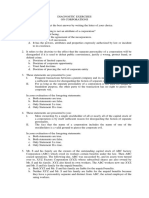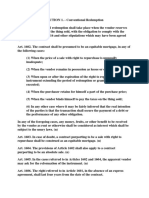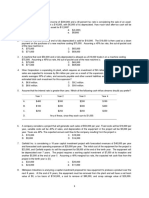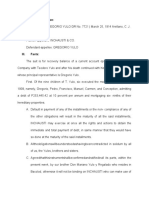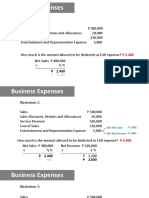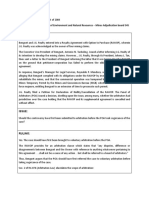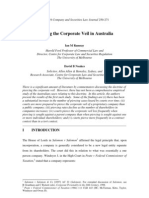0 ratings0% found this document useful (0 votes)
49 viewsLaw On Sales-Chapter 2-3
Law On Sales-Chapter 2-3
Uploaded by
Mickaela Jaira AlvarezThis document summarizes laws regarding capacity to buy or sell and the effects of contracts when the thing sold is lost.
1) It outlines who can enter into contracts of sale and exceptions for minors and incapacitated persons. Contracts by minors and incapacitated persons are voidable.
2) Husband and wife cannot sell property to each other with some exceptions. Certain persons like guardians and public officials are also prohibited from acquiring property by purchase to prevent fraud.
3) If the thing sold is entirely lost at the time of sale, the contract is void. If partially lost, the buyer can withdraw or demand the remaining part with a proportionate price reduction.
4)
Copyright:
© All Rights Reserved
Available Formats
Download as PDF, TXT or read online from Scribd
Law On Sales-Chapter 2-3
Law On Sales-Chapter 2-3
Uploaded by
Mickaela Jaira Alvarez0 ratings0% found this document useful (0 votes)
49 views5 pagesThis document summarizes laws regarding capacity to buy or sell and the effects of contracts when the thing sold is lost.
1) It outlines who can enter into contracts of sale and exceptions for minors and incapacitated persons. Contracts by minors and incapacitated persons are voidable.
2) Husband and wife cannot sell property to each other with some exceptions. Certain persons like guardians and public officials are also prohibited from acquiring property by purchase to prevent fraud.
3) If the thing sold is entirely lost at the time of sale, the contract is void. If partially lost, the buyer can withdraw or demand the remaining part with a proportionate price reduction.
4)
Original Title
Law on Sales-Chapter 2-3
Copyright
© © All Rights Reserved
Available Formats
PDF, TXT or read online from Scribd
Share this document
Did you find this document useful?
Is this content inappropriate?
This document summarizes laws regarding capacity to buy or sell and the effects of contracts when the thing sold is lost.
1) It outlines who can enter into contracts of sale and exceptions for minors and incapacitated persons. Contracts by minors and incapacitated persons are voidable.
2) Husband and wife cannot sell property to each other with some exceptions. Certain persons like guardians and public officials are also prohibited from acquiring property by purchase to prevent fraud.
3) If the thing sold is entirely lost at the time of sale, the contract is void. If partially lost, the buyer can withdraw or demand the remaining part with a proportionate price reduction.
4)
Copyright:
© All Rights Reserved
Available Formats
Download as PDF, TXT or read online from Scribd
Download as pdf or txt
0 ratings0% found this document useful (0 votes)
49 views5 pagesLaw On Sales-Chapter 2-3
Law On Sales-Chapter 2-3
Uploaded by
Mickaela Jaira AlvarezThis document summarizes laws regarding capacity to buy or sell and the effects of contracts when the thing sold is lost.
1) It outlines who can enter into contracts of sale and exceptions for minors and incapacitated persons. Contracts by minors and incapacitated persons are voidable.
2) Husband and wife cannot sell property to each other with some exceptions. Certain persons like guardians and public officials are also prohibited from acquiring property by purchase to prevent fraud.
3) If the thing sold is entirely lost at the time of sale, the contract is void. If partially lost, the buyer can withdraw or demand the remaining part with a proportionate price reduction.
4)
Copyright:
© All Rights Reserved
Available Formats
Download as PDF, TXT or read online from Scribd
Download as pdf or txt
You are on page 1of 5
Law on Sales
Chapter 2 – Capacity to Buy or Sell
ARTICLE GENERAL RULE EXCEPTION ADDITIONAL INFORMATION
Article • All person who are • Case: Law Kinds of Incapacity:
1489 authorized in this code to determines that • Absolute - pertains to
Person who obligate themselves, may party suffers from persons who cannot bind
may Enter enter into a contract of either absolute or themselves. Ex. Minor,
into a sale. relative incapacity. Insane or demented
Contract of • Contracts entered into • However, where the persons.
Sale by a minor and other necessaries are • Relative Incapacity –
incapacitated persons sold and delivered where it exists only with
are voidable. to him without the reference to certain
intervention of the persons or class of
parent or guardian, property
he must pay a • Necessaries - those
reasonable price things which are needed
therefor. for sustenance, dwelling,
clothing and medical
attendance.
Article 1490 The husband and the wife Unless: Reason for the Rule:
Incapacity cannot sell property to each • When a separation • To prevent commission of
by Relation other of property was fraud or prejudice to third
agreed upon in the persons.
marriage • To prevent one from
settlements; unduly influencing the
other.
• When there has been • To avoid indirect
a judicial separation donations.
of property under
article 191. (1458a)
Article 1491 The following persons • Exception for the Reason for Prohibition:
Incapacity cannot acquire by purchase, agent: unless the • TO Prevent frauds on the
by Reason even at a public or judicial consent of the part of the persons
auction, either in person principal has been enumerated therein and
or through the mediation given. minimize temptation to
of another: the exertion of undue and
• Guardian improper influence.
• Agents, sale entrusted to • The law does not trust
them. human nature to resist
• Executors and the temptation likely to
administrators arise out the antagonism
• Public officers and between interest of the
employees seller and the buyer.
• Justices, judges,
prosecuting attorneys,
clerks of superior and
inferior courts, and
other officers and
employees connected
with the administration
of justice
• Any others specially
disqualified by law.
The prohibitions in the two
preceding articles are
applicable to sales in legal
redemption, compromises
and renunciations.
Article 1492 The prohibitions in the two 1. The relative incapacity
Prohibition preceding articles are applies also to sales by
Extends to applicable to sales in legal virtue of legal redemption,
Sales in Legal redemption, compromises compromise, and
Redemption and renunciations. renunciations:
• Compromise - contract
whereby the parties, by
reciprocal concessions,
avoid a litigation or put
an end to one already
commenced.
• Renunciation - creditor
gratuitously abandons
his right against his
creditor. Condonation
and Remission.
2. The persons disqualified to
buy referred to in Articles
1490 and 1491 are also
disqualified to become
lessees of the things
mentioned therein. (Art.
1646.)
Chapter 3 – Effects of the Contract when the Thing Sold has been Lost
ARTICLE GENERAL RULE EXCEPTION ADDITIONAL INFORMATION
Article 1493 If at the time the contract But if the thing should Effect of loss of thing at the
Effect of of sale is perfected, the have been lost in part time of sale: (Remedies)
Loss of Thing thing which is the object of only, the vendee may 1. Thing entirely lost. —
at the Time the contract has been choose between Where the thing is entirely
of Sale entirely lost, the contract withdrawing from the lost at the time of
shall be without any effect. contract and perfection, the contract
demanding the is inexistent and void (Art.
remaining part, paying 1409[3].) because there is
its price in proportion no object.
to the total sum agreed 2. Thing only partially lost. —
upon. (1460a) If the subject matter is
only partially lost, the
vendee may elect between
withdrawing from the
contract and demanding
the remaining part, paying
its proportionate price.
Article 1494 Where the parties purport a Effect of loss in case of
Effect of sale of specific goods, and specific goods:
Loss in Case the goods without the • Sale divisible. — The second
of Specific knowledge of the seller has option is available only if
Goods perished in part or have the sale is divisible. A
wholly or in a material part contract is divisible when
so deteriorated in quality as its consideration is made
to be substantially changed up of several parts.
in character, the buyer may • Sale indivisible. — Suppose
at his option treat the sale: the sale is not divisible,
(1) as avoided; or what price is the buyer to
(2) as valid in all of the pay for the remaining
existing goods or in so much goods if he elects to
thereof as have not continue with the sale? It
deteriorated, and as binding is believed that the buyer
the buyer to pay the agreed should be made to pay only
price for the goods in the proportionate price
which the ownership will of the remaining goods. If
pass, if the sale was divisible. the sale is indivisible, the
object thereof may be
considered as a specific
thing.
You might also like
- Obligation and Contrcacts SummaryDocument7 pagesObligation and Contrcacts SummaryRaffy Roncales90% (29)
- BG, SBLC, Rwa LeaseDocument23 pagesBG, SBLC, Rwa LeaseJosephNo ratings yet
- OBLICONDocument1 pageOBLICONAngelica RoseNo ratings yet
- RFBT 04 09 Law On SalesDocument71 pagesRFBT 04 09 Law On Salesmarin100% (1)
- Chapter 3 Effects of Contract When The Thing Sold Has Been LostDocument4 pagesChapter 3 Effects of Contract When The Thing Sold Has Been LostApple Ke-eNo ratings yet
- Pdic-Example ComputationDocument9 pagesPdic-Example ComputationAndrei Nicole RiveraNo ratings yet
- BALAWREX ReviewerDocument14 pagesBALAWREX Reviewerhervasirishmae01No ratings yet
- Accounting For Income TaxDocument56 pagesAccounting For Income TaxEau Claire DomingoNo ratings yet
- Chapter 5 General ProvisionDocument3 pagesChapter 5 General ProvisionSteffany RoqueNo ratings yet
- 7&8 - Analytics Workbook - v2023-6Document30 pages7&8 - Analytics Workbook - v2023-6Karla Cathrina FernandoNo ratings yet
- FAR.3208 Investment PropertyDocument3 pagesFAR.3208 Investment PropertyMira Louise HernandezNo ratings yet
- 07 Investment in AssociatesDocument5 pages07 Investment in AssociatesAllegria AlamoNo ratings yet
- Acctg 202 Problems With SolutionsDocument7 pagesAcctg 202 Problems With SolutionsTray AhlNo ratings yet
- Recto Law and Maceda Law Part 1Document1 pageRecto Law and Maceda Law Part 1Priscilla DawnNo ratings yet
- Chapter 2Document9 pagesChapter 2WesNo ratings yet
- Activities For Tax 1 - Part 1Document3 pagesActivities For Tax 1 - Part 1Joshua Cabinas100% (1)
- ACCTRAN Engage: Kaya Ulit Natin To Partner!Document2 pagesACCTRAN Engage: Kaya Ulit Natin To Partner!Kristine SantanderNo ratings yet
- C - Comprehensive BudgetingDocument8 pagesC - Comprehensive Budgetingian dizonNo ratings yet
- 3 SalesDocument88 pages3 SalesLayNo ratings yet
- C8 Statement of Financial PositionDocument14 pagesC8 Statement of Financial PositionAllaine ElfaNo ratings yet
- Acclaw Notes CompleteDocument315 pagesAcclaw Notes CompleteAngel Blue CruzNo ratings yet
- BAM 208 - SAS - Day 3 - OUTDocument10 pagesBAM 208 - SAS - Day 3 - OUTAriane Grace Hiteroza MargajayNo ratings yet
- DE GUZMAN Learning CurveDocument3 pagesDE GUZMAN Learning CurveDe MarcusNo ratings yet
- 6.0 Extinguishment of SaleDocument35 pages6.0 Extinguishment of SaleHanna ValerosoNo ratings yet
- Toaz - Info Module 2 Warranty Liability and Provision and Contingent Liability PRDocument20 pagesToaz - Info Module 2 Warranty Liability and Provision and Contingent Liability PRHanna RomasantaNo ratings yet
- 5study GuideCONTRACTS Chapter 5Document4 pages5study GuideCONTRACTS Chapter 5Al Cheeno AnonuevoNo ratings yet
- Hello Tax Income Taxation True or FalseDocument51 pagesHello Tax Income Taxation True or FalseCassie ParkNo ratings yet
- Final Reviewer in RFLIBDocument14 pagesFinal Reviewer in RFLIBMichelle EsternonNo ratings yet
- RFBT.04 Law On Credit TransactionDocument2 pagesRFBT.04 Law On Credit TransactionRhea Royce CabuhatNo ratings yet
- Corporate Governance, Business Ethics, Risk Management and Internal Control CHAPTER 1. Introduction To Corporate GovernanceDocument10 pagesCorporate Governance, Business Ethics, Risk Management and Internal Control CHAPTER 1. Introduction To Corporate Governanceyen yenNo ratings yet
- 100 Question Law On Sales PDF FreeDocument11 pages100 Question Law On Sales PDF Freejayrocampo03No ratings yet
- Solution 2Document5 pagesSolution 2Alexandria SomethingNo ratings yet
- 02 - PremiumsDocument48 pages02 - Premiumslorelyngonzales23No ratings yet
- Information SystemDocument13 pagesInformation SystemMansour HamjaNo ratings yet
- Review of Cost ConceptsDocument14 pagesReview of Cost ConceptsVincent PanisalesNo ratings yet
- Take Home Quiz in PartnershipDocument5 pagesTake Home Quiz in PartnershipSheena Estrella100% (1)
- Diagnostic Exercises2Document32 pagesDiagnostic Exercises2HanaNo ratings yet
- Basic Concepts 6Document4 pagesBasic Concepts 6NaddieNo ratings yet
- Tax Term Quiz TheoriesDocument6 pagesTax Term Quiz TheoriesRena Jocelle NalzaroNo ratings yet
- Sec. 1601 To 1618 of NCCDocument3 pagesSec. 1601 To 1618 of NCCGuiller C. MagsumbolNo ratings yet
- Capital Budgeting Simulated ExamDocument11 pagesCapital Budgeting Simulated ExamSarah BalisacanNo ratings yet
- Lease Accounting LessorDocument13 pagesLease Accounting LessorIts meh SushiNo ratings yet
- Business Law Chapter-4Document3 pagesBusiness Law Chapter-4Gita KnowledgeNo ratings yet
- Tax Final Notes. 1Document25 pagesTax Final Notes. 1Hannah MeranoNo ratings yet
- Pacor Compiled Art.1767 1804 1Document48 pagesPacor Compiled Art.1767 1804 1Charles CabarlesNo ratings yet
- Exam Labor RelationsDocument2 pagesExam Labor RelationsBENJIELITO EMPENADONo ratings yet
- COOPERATIVE CODE - Key AnswersDocument6 pagesCOOPERATIVE CODE - Key Answers여자라라No ratings yet
- CBCTG Midterm ExamDocument13 pagesCBCTG Midterm ExamJuvy LagardeNo ratings yet
- Notes: True or False - Accounting Policies, Changes in Estimates & ErrorsDocument2 pagesNotes: True or False - Accounting Policies, Changes in Estimates & Errorskim cheNo ratings yet
- Hq04 AgencyDocument8 pagesHq04 AgencyClarisaJoy Sy50% (2)
- Case-Digest-1 Inchausti VS YuloDocument6 pagesCase-Digest-1 Inchausti VS YuloAiemiel ZyrraneNo ratings yet
- Acclaw3 C QuizDocument3 pagesAcclaw3 C QuizCiana SacdalanNo ratings yet
- AC 2202 - Notes (1 TO 4)Document40 pagesAC 2202 - Notes (1 TO 4)SMT awesomeNo ratings yet
- Deductions ExamplesDocument25 pagesDeductions ExamplesKezNo ratings yet
- Consumer Protection Act NotesDocument6 pagesConsumer Protection Act NotesAbarilles, Sherinah Mae P.No ratings yet
- 5.1. Debt Market Instrument CharacteristicsDocument15 pages5.1. Debt Market Instrument CharacteristicsMavis LunaNo ratings yet
- Business Tax Chapter 6 ReviewerDocument4 pagesBusiness Tax Chapter 6 ReviewerMurien LimNo ratings yet
- Question 1: (3 Points)Document9 pagesQuestion 1: (3 Points)Akmal ShahzadNo ratings yet
- Chapter Exam - Partnership Dissolution - 3Document13 pagesChapter Exam - Partnership Dissolution - 3NarikoNo ratings yet
- The Revised Corporation Code of The Philippines Republic Act No. 11232Document30 pagesThe Revised Corporation Code of The Philippines Republic Act No. 11232Poison IvyNo ratings yet
- Chap Quiz To PrintDocument6 pagesChap Quiz To PrintKyla Alap-apNo ratings yet
- Consent in Law On SalesDocument3 pagesConsent in Law On SalesK GonzalesNo ratings yet
- Indian Contract Act Imp MCQsDocument23 pagesIndian Contract Act Imp MCQsdhruv sharmaNo ratings yet
- Benguet Corp Vs Department of Environment and Natural Resources - Mines Adjudication Board 545 SCRA 196 (2008)Document3 pagesBenguet Corp Vs Department of Environment and Natural Resources - Mines Adjudication Board 545 SCRA 196 (2008)Dante CastilloNo ratings yet
- G.R. No. L-24043Document3 pagesG.R. No. L-24043Hanifa D. Al-ObinayNo ratings yet
- Chap 16Document33 pagesChap 16Sakshi GuptaNo ratings yet
- Sublease Contract TemplateDocument8 pagesSublease Contract TemplateAzizul KirosakiNo ratings yet
- Letter To Client0913Document2 pagesLetter To Client0913api-113903284No ratings yet
- M02 - ObliCon - Nature and Effect of Obligation PDFDocument8 pagesM02 - ObliCon - Nature and Effect of Obligation PDFTam GarciaNo ratings yet
- CNH Industrial General Purchasing Terms and Conditions EMEADocument40 pagesCNH Industrial General Purchasing Terms and Conditions EMEADhhdhdNo ratings yet
- PCC Case No. M-2018-002 (MAO Case No. M-39-2017) Full Case ReportDocument2 pagesPCC Case No. M-2018-002 (MAO Case No. M-39-2017) Full Case ReportJayNo ratings yet
- Piercing The Corporate VeilDocument40 pagesPiercing The Corporate VeilJacky WuNo ratings yet
- Case Digests For SalesDocument11 pagesCase Digests For SalesJanine CastroNo ratings yet
- It 3Document13 pagesIt 3Gabrielle Anne MagsanocNo ratings yet
- TelexFree - Certificate of Appointment of Chapter 11 TrusteeDocument18 pagesTelexFree - Certificate of Appointment of Chapter 11 TrusteeTim Durken0% (1)
- Annexure 2 - Consent Letter of InsuredDocument1 pageAnnexure 2 - Consent Letter of Insuredrapworld44No ratings yet
- Cruz vs. Bancom Finance Corporation, 379 SCRA 490, March 19, 2002Document22 pagesCruz vs. Bancom Finance Corporation, 379 SCRA 490, March 19, 2002marvin ninoNo ratings yet
- Dolores Alejo v. Sps. Ernesto Cortez and Priscilla San PedroDocument7 pagesDolores Alejo v. Sps. Ernesto Cortez and Priscilla San PedroSyed Almendras IINo ratings yet
- Clause 8: Commencement, Delays and SuspensionDocument24 pagesClause 8: Commencement, Delays and SuspensionJane Panganiban100% (1)
- G.R. No. 70054, December 11, 1991 Banco Filipino Savings and Mortgage Bank vs. Central BankDocument2 pagesG.R. No. 70054, December 11, 1991 Banco Filipino Savings and Mortgage Bank vs. Central BankAngelicka Jane Resurreccion100% (1)
- YEM Gold Sale ProcedureDocument12 pagesYEM Gold Sale ProcedureSaumyadeepa Dhar100% (1)
- 5E Condition CardsDocument6 pages5E Condition Cardscastile.dungeonNo ratings yet
- 7ce13industrial Disputes and Individual Disputes Section 2 (K) & Section 2-ADocument7 pages7ce13industrial Disputes and Individual Disputes Section 2 (K) & Section 2-AJasleen SoinNo ratings yet
- 08PGFM028 Security Analysis and Portfolio Management - 2023-25Document2 pages08PGFM028 Security Analysis and Portfolio Management - 2023-25Vanshita SethNo ratings yet
- 3 Irish Bus LRev 1Document15 pages3 Irish Bus LRev 1Jung AleehsusNo ratings yet
- Principle of ContractDocument18 pagesPrinciple of ContractSingh PrakashNo ratings yet
- Formato Convenio de Confidencialidad en InglésDocument3 pagesFormato Convenio de Confidencialidad en InglésFernando MontesdeocaNo ratings yet
- Document 1Document2 pagesDocument 1mada aparnaNo ratings yet
- Case Study Analysis "NDTV vs. Mr. Sunil": Legal Aspects in Business AssignmentDocument11 pagesCase Study Analysis "NDTV vs. Mr. Sunil": Legal Aspects in Business AssignmentKartik JainNo ratings yet
- Accounting For Franchise Operation - FranchisorDocument4 pagesAccounting For Franchise Operation - FranchisorJanella Umieh De UngriaNo ratings yet




































